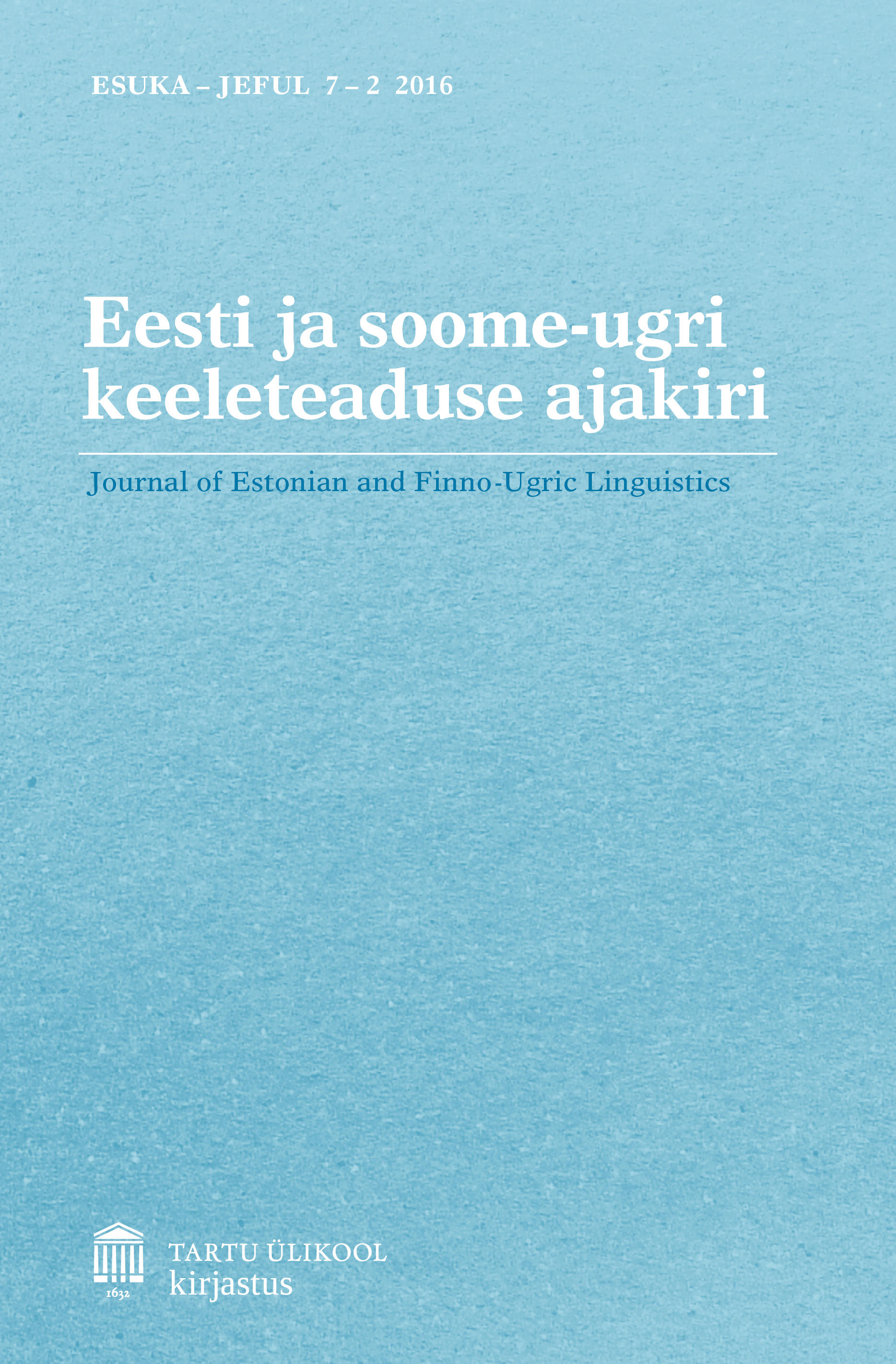Eesti modaalverbi <i>pidama</i> episteemilistest kasutustest võrdluses prantsuse verbiga <i>devoir</i>
DOI:
https://doi.org/10.12697/jeful.2016.7.2.07Keywords:
modaalverbid, episteemiline modaalsus, evidentsiaalsus, eesti keel, prantsuse keelAbstract
Kokkuvõte. Artiklis vaadeldakse eesti keele modaalverbi pidama episteemilisi kasutusi võrdluses prantsuse keele modaalverbiga devoir. Episteemiliste kasutuste all on mõeldud juhtumeid, kus pidama ja devoir väljendavad kõneleja hinnangut kirjeldatud situatsiooni toimumise tõenäosusastme kohta. Analüüs tugineb tõlkekorpuse näidetele, milles pidama esineb nii originaal- kui ka tõlketekstides. Tõlkevastete analüüs näitab, et eesti verbi pidama kasutatakse prantsuse verbi devoir vastena episteemilises tähenduses tunduvalt harvemini kui vastupidi. Artikli eesmärk on välja selgitada selle ebasümmeetria põhjused ning tuua välja eesti verbi pidama episteemilise kasutusvälja eripärad võrreldes prantsuse analoogi ja sõnaraamatuvastega. Näidete analüüsi põhjal võib järeldada, et eesti keele verbil pidama on võrreldes verbiga devoir kitsam ulatus episteemilise hinnangu tugevuse skaalal. Verbi devoir indikatiivivormid on palju laiemalt kasutusel situatsiooni suhteliselt madala tõenäosuse väljendamisel. Verbi devoir vorm saab väljendada lisaks situatsiooni ajale ka eitust või situatsiooni aspektilisi omadusi, samas kui verbil pidama on episteemilises kasutuses piiratud vormistik. Tulemused näitavad, et verbide pidama ja devoir evidentsiaalsed omadused on sarnased ning neid ei saa vaadelda korrelatsioonis modaaltähendusega: episteemilise hinnangu tugevus ei sõltu otseselt infoallika subjektiivsusastmest või järelduse muudest omadustest.
Abstract. Anu Treikelder: The epistemic use of the Estonian modal pidama in comparison with the French modal devoir. This article examines the epistemic uses of the Estonian modal verb pidama in comparison with the same type of verb devoir in French. The analysis is based on samples from a parallel corpus of translations in which pidama occurs both in originals and in translations. The general translation data reveal that the Estonian pidama is used as the equivalent of the French verb devoir less often than vice versa. The aim of this article is to find out the reasons of this asymmetry and to point out the peculiarities of the epistemic usage of pidama compared to its French counterpart. The findings of the corpus reveal some differences in the formal aspect of the two verbs: the epistemic devoir can express besides the time of the situation also aspect and it can occur in the negative form. The Estonian verb pidama has a more restricted paradigm in its epistemic uses. More importantly, the results of the study suggest that variations in translation are not merely due to the preferences of translators but that they reveal also differences in the epistemic meaning of these two verbs. The French modal devoir seems to offer a wider range of epistemic uses than its Estonian counterpart: it allows expressing different degrees of likelihood of a state of affairs on the scale from high to rather low probability, while Estonian pidama stays closer to the pole of (very) high probability. On the other hand, the evidential properties, concerning the source and the nature of the inference conveyed by the epistemic meaning of these two verbs, seem to be rather similar. This result seems to prove that epistemic and evidential categories are not directly correlated in the meaning of modal verbs: the strength of the epistemic evaluation does not depend on the reliability of the source of information.
Keywords: modal verbs; epistemic modality; evidentiality; Estonian; French


